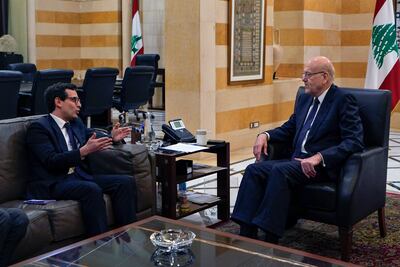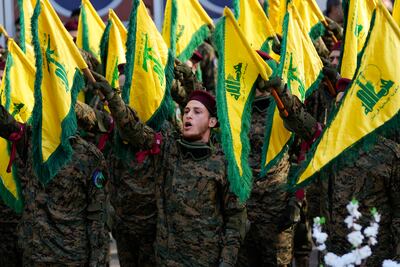Live updates: Follow the latest news on Israel-Gaza
France's border de-escalation plan aims to lay the groundwork for restoring safety along the Lebanon-Israel border after the end of the Israel-Gaza war, a western diplomat told The National, despite the proposals facing significant obstacles.
France's Foreign Minister presented to Lebanese authorities the first written proposal to end hostilities between Israeli forces and armed groups led by Hezbollah in Lebanon after weeks of western mediation, Reuters reported on Tuesday.
But Hezbollah, which is backed by Iran and allied with Hamas, has repeatedly stated there will be no talks to end hostilities without a ceasefire in Gaza.
The group opened a front on the Israel-Lebanon border to divert Israel's military capabilities away from its operations in Gaza on October 8. Since then, Israeli air strikes and heavy shelling have hit Hezbollah targets in southern Lebanon, while the group has fired volleys of rockets into Israel.
“Hezbollah remains entrenched in its positions: there won't be an agreement as long as there is a war in Gaza. But, this doesn't preclude discussions beforehand,” the western diplomat said.
“Such a proposal triggers reactions. This could be seen as pre-negotiations to accelerate the post-Gaza war process.”
Hezbollah's leader Hassan Nasrallah condemned the western proposals to end the Israel-Lebanon conflict during a speech on Tuesday, claiming they only serve Israeli interests.
"They take the proposal from Israel without any comments or criticisms and present it to Lebanon as if we are supposed to accept it," he said.
"Mr Nasrallah addressed this proposal and others in his speech, describing them as having a singular goal, which is to provide security for Israel", a spokesman for Hezbollah told The National.

France's proposal
The document was delivered to senior Lebanese state officials including caretaker Prime Minister Najib Mikati by French Foreign Minister Stephane Sejourne last week, Reuters reported, quoting four senior Lebanese and three French officials.
“The Lebanese authorities shared their feedbacks,” he confirmed to The National.
France, a former colonial power in Lebanon, has maintained significant political influence in the country. It has 20,000 citizens residing there and approximately 800 troops deployed as part of a UN peacekeeping force.
Reuters said the document proposed Hezbollah would dismantle all premises and facilities close to the frontier and withdraw combat forces – including Hezbollah's elite Radwan fighters and military capabilities such as anti-tank systems – at least 10km north of the frontier.
This would allow the safe return of the tens of thousands of Israelis displaced from the northern border.
The proposal said within 10 days of the Hezbollah withdrawal, Lebanon and Israel would resume negotiations on delimiting the 13 disputed points along the Israel-Lebanon border “in a gradual way”, according to Reuters.
At the same time, Israel would halt air and artillery strikes inside Lebanon. Israel has been accused of using white phosphorus, a highly toxic substance that burns on contact with air and causes burn injuries.

Contentious points
The western diplomat said this proposal remains a blueprint open to negotiations. He stressed there were two main contentious points.
The first issue relates to the plan for Hezbollah to withdraw from the border. The group is deeply entrenched within the local population in southern Lebanon.
“It would be easier to transfer the Litani river to the border than it would be to transfer Hezbollah north of the Litani,” Mr Nasrallah said in his Tuesday speech, referring to previous proposals requesting Hezbollah to withdraw up to the Litani, 30km from the border.
“I don't think Hezbollah will formally accept a complete withdrawal but they may render their presence invisible or partially withdraw,” the source said.
The other issue, the source said, is the idea of an international surveillance mechanism to monitor violations of the agreement.
This mechanism would be based on the 1996 committee, which included Israel, Lebanon, the US, and France, established after the Israeli army's 17-day campaign against Hezbollah known as Operation Grapes of Wrath in April that year.
“Nothing is set in stone. The idea was to start something to launch a discussion,” the diplomat said.

Israel cannot 'impose conditions'
Israel said it was studying the proposals, according to Reuters.
“On principle, Israel agrees with that kind of diplomatic solution, but they are sceptical that an agreement can be found,” the source said.
Israel has repeatedly threatened to initiate a major operation in Lebanon if the diplomatic efforts concerning a border agreement were to fail.
“The enemy is not in a position to impose conditions on Lebanon,” Mr Nasrallah said.
“The issue of the 13 points is always presented as up for discussion “after” a ceasefire in south Lebanon, so the proposal offers Lebanon pretty much nothing in return besides promises of future negotiations,” he said.
Since the Gaza war began on October 7, there has been growing fear that daily clashes between the Lebanese armed group and Israel could become a full-scale war.
Cross-border fire since the start of the Gaza war has killed at least 238 people in Lebanon, most of them Hezbollah fighters but also about 30 civilians, AFP reported. On the Israeli side, nine soldiers and six civilians were killed.
More than 28,300 people have been killed in Gaza under fierce Israeli bombardment, after Hamas launched a surprise attack in southern Israel on October 7, killing about 1,200 people.



